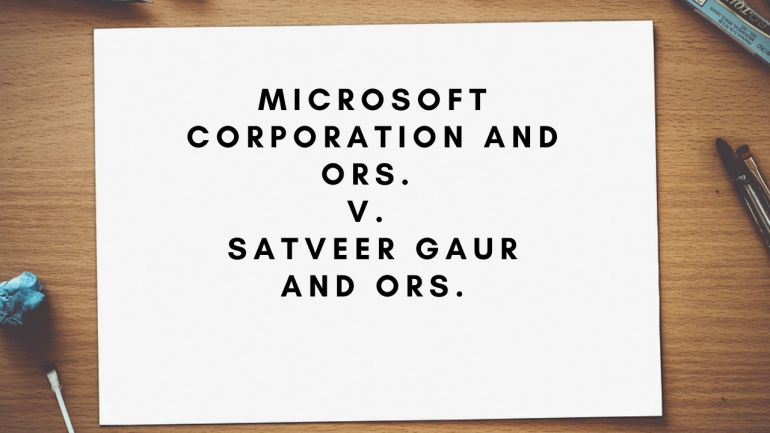

Microsoft Corporation and Ors. v. Satveer Gaur and Ors
The High Court of Delhi has awarded Rs thirty lakh as damages to Microsoft Corporation, Adobe Systems, and Quest Software in connection with a suit against a Nehru Place company for using their pirated software. Microsoft Corporation, Adobe Systems and Quest Software (Plaintiffs) had moved the High Court against the Defendant, a company named ‘Chetu’ which provided IT solutions and services to its clients, and its related parties, after it came to its knowledge that the Defendant was using pirated or unlicensed software programs of the Plaintiffs on its computers.
The plaintiffs suffered uncountable damages to their intellectual property business and rights on account of several forms of copyright piracy in their software programs because reproducing the plaintiffs’ software and the packaging of that software so that purchasers are deliberately misled to believe that the product they are buying is genuine software.
Moreover, they filed the case because of the most damaging form of software piracy which occurs when businesses, companies, corporations, institutions, schools, non-profit organizations, etc., make additional copies of plaintiffs’ software without permission. The reproduction of the plaintiffs’ software without the plaintiffs’ permission is an infringement of their copyright in their software programs.
Hence, the following plaintiffs filed a suit for damages against the defendant company who provides system solutions to its clients and another defendant is its a system administrator.
- The plaintiff No.1 is Microsoft Corporation
- The plaintiff No.2 is Microsoft Corporation Pvt. Ltd.
- Plaintiff No. 3 is Adobe Systems.
- The plaintiff No.4 is Quest Software Inc.
Issues
The primary issues in the present case were:
- Whether the court at Delhi is not vested with the territorial jurisdiction to try and entertain the suit?
- Whether the suit is devoid of any cause of action against the defendants?
- Whether the plaintiffs are the owners of the copyright over the works claimed in the suit?
- Whether the defendants have infringed the copyright of the plaintiffs in the said works?
- Whether the defendants have purchased the necessary license from the plaintiff for the usage of the software in question?
- Whether the plaintiff is entitled to the relief of permanent injunction against the defendants, as prayed for in para 64 (a) of the plaint?
- Whether the plaintiff is entitled to the relief of delivery up of the impugned products against the defendants, as prayed for in para 64(b) of the plaint?
- Whether the plaintiff is entitled to the rendition of accounts of the profits, as prayed for in para 64(c) of the plaint?
- Whether the plaintiff is entitled to damages for a sum of Rs.60,00,000 or any lesser amount from the defendant, as prayed for in para 64(d) of the plaint?
Judgment
The Delhi High Court referred judgment of the Apex Court in the case of Indian Performing Rites Society vs. Sanjay Dalia (2015) 10 SCC 161, wherein the Apex Court inter-alia upheld that a suit can be filed at a place where the plaintiff has a principal place of office and not a subordinate office. The principal place of office of the plaintiff No.2 is in Delhi. Furthermore, the Court stated that the registered Office of defendant No.2 is also in Delhi, and Issue no. 1 was decided accordingly.
Defendant failed to appear for the issue no. 2to 9 and the same was decided accordingly in the favor of the plaintiffs.
Further, the High Court of Delhi awarded damages to the tune of Rs. thirty lakhs in favor of the plaintiffs to be shared equally by all of them.
The High Court of Delhi made the following observations in this case:
- That the Plaintiffs are well - established and renowned global software companies that allow the users to purchase licenses to their software and use it in an effective and efficient manner. Their business is spread across several continents and they generate high global revenues.
- The Plaintiff’s software is protected under the Copyright Act 1957 and thus, the owners of this software have an absolute right to the software and the income generated thereof.
- That the Defendants are engaged in the business of reproducing or burning the Plaintiff’s software in compact discs (CDs) hard disks, etc; installation and operation of pirated software in computer systems; and reproducing the Plaintiff’s software in such a manner that purchasers believe that it is a genuine software.
- That certain investigators and the Local Commissioner appointed by the Court conducted an investigation at the Defendant’s place of business. Their report stated that the Defendants could not produce any license, invoice, or any other document to show the legal and certified use of the Plaintiff’s software. Thus, the Local Commissioner seized around fifty-one computers containing the infringed software.
- That the unauthorized use of Plaintiff’s software by the Defendants has caused immense loss to the reputation, goodwill, and business of the Plaintiffs and has further caused infringement of Copyright of the Plaintiffs.
Thus, the Court passed an Order of Permanent Injunction to restrain the Defendants, their directors, employees, officers, agents, etc from directly or indirectly engaging in any kind of computer-related activities; using, reproducing and distributing pirated or unlicensed or unauthorized software of the Plaintiffs, and any other activity infringing the Copyright of the Plaintiffs. The Plaintiffs were also handed over the seized goods for destruction within two months from the date of this Judgment. Further, the Court permitted damages of Rs. thirty Lakhs to be equally shared by and between the Plaintiffs.



